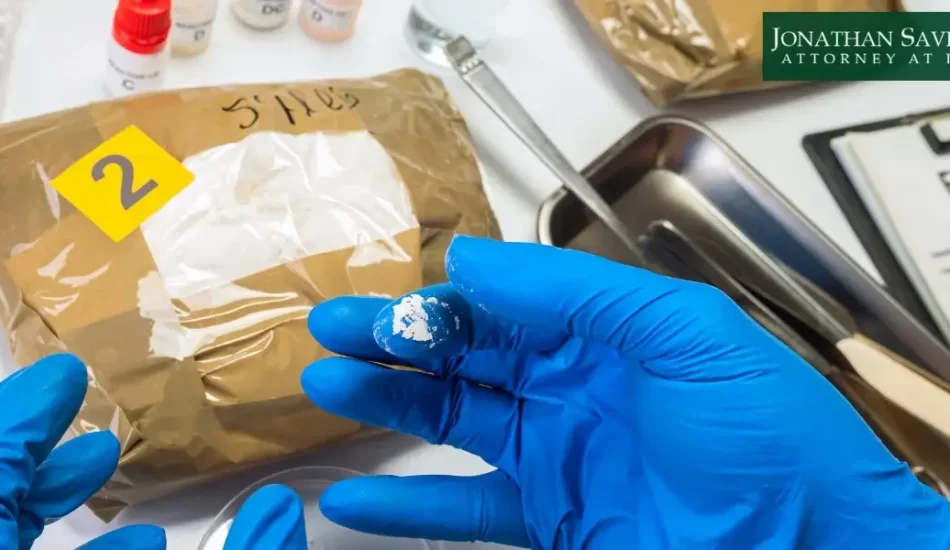|
|
Last Modified on Nov 11, 2024
Whether you are arrested with possession of a small amount of drugs or charged with more serious crimes, New York’s criminal justice system can be intimidating. The state’s zero-tolerance approach to prosecuting drug crimes means that even first-time offenders face serious consequences upon conviction. Understanding New York drug crime laws and penalties can help you better assess your situation as you prepare your defense.
What Are the Different Types of Drug Crimes in New York?
New York classifies drug crimes into several categories, ranging from simple possession to drug trafficking. Each category carries its own set of penalties, with the most serious crimes involving large-scale drug distribution or trafficking. Some of the most common drug crimes in New York include:
- Possession of a Controlled Substance: Possessing illegal drugs, such as cocaine, heroin, marijuana (in certain circumstances), or prescription drugs without a valid prescription, can lead to serious criminal charges.
- Drug Distribution and Trafficking: Distribution or trafficking of controlled substances involves selling, transporting, or distributing drugs to others, often resulting in harsher penalties than possession alone.
- Drug Manufacturing: The production of illicit drugs, such as methamphetamine or ecstasy, carries severe penalties, particularly if the manufacturing involves dangerous chemicals or large-scale operations.
- Possession With Intent to Sell: When law enforcement believes an individual has drugs with the intent to distribute them, they may face more severe charges than simple possession.
Understanding the distinctions between these offenses and their potential consequences is crucial for building a strong defense and protecting your rights. Knowledge of the law is your first avenue of defense when navigating New York’s strict drug crime statutes.
Penalties for Drug Possession in New York
Drug possession is one of the most common drug-related offenses in New York. The penalties vary based on the type and amount of the controlled substance involved.
Possession of Marijuana
While marijuana is legal for medical use and recreational use for adults 21 and over, possession of more than a certain amount without the proper license can lead to misdemeanor or felony charges. Under New York’s recent marijuana legalization law, adults may possess up to three ounces of marijuana. Possessing over that limit can result in criminal charges.
Possession of Controlled Substances
Possessing controlled substances, like cocaine, heroin, or other illegal drugs, is classified as a crime, and the penalties depend on the quantity of drugs in your possession. Simple possession can result in charges ranging from a misdemeanor to a felony.
Possessing less than two ounces of a narcotic like heroin could lead to a Class A misdemeanor, while possession of larger quantities could result in Class B or Class C felony charges, leading to years in prison.
Possession of Prescription Drugs
Possessing prescription drugs without a valid prescription, such as opioids or benzodiazepines, can lead to felony charges. New York law is very strict about controlled substances, and possession with the intent to misuse or sell these drugs can carry severe penalties.
Penalties for Drug Trafficking and Distribution in New York
Drug trafficking, or the distribution of controlled substances, carries some of the most severe penalties under New York’s drug laws. Drug trafficking is viewed as a serious danger to society, and anyone convicted of this crime faces the possibility of mandatory minimum sentences.
- Class A Felony: The most serious drug trafficking offenses, such as trafficking large amounts of heroin, cocaine, or methamphetamine, can result in Class A felony charges. This carries a penalty of years in prison and a fine.
- Class B and C Felonies: Trafficking smaller quantities of drugs still leads to serious penalties, including long prison sentences. A conviction for a Class B or C felony may result in several years of imprisonment.
- Mandatory Minimum Sentences: In New York, certain drug trafficking offenses carry mandatory minimum sentences, meaning a judge must impose a minimum sentence, regardless of the circumstances. These mandatory sentences are designed to deter large-scale drug distribution and protect communities from drug-related harm.
Drug trafficking charges do not result in light sentences. Anyone convicted of transporting drugs would face serious prison time, even for first-time offenses. Legal representation can allow defendants to fight the charges and potentially have them reduced or dropped altogether.
FAQs
Q: What Are the Drug Laws in New York?
A: New York’s drug laws categorize controlled substances into schedules based on their potential for abuse and accepted medical use. Offenses include possession, sale, manufacturing, and trafficking, with penalties varying according to the substance type, quantity, and nature of the offense. The state has reformed its drug laws over time, aiming to balance public safety with rehabilitation efforts.
Q: How Long Do You Go to Jail for Drug Possession in New York?
A: The incarceration period for drug possession in New York depends on factors such as the substance involved, the amount, and prior convictions. For instance, possessing a small quantity of a controlled substance may result in a Class A misdemeanor, punishable by up to one year in jail. Larger amounts or possession with intent to sell can lead to felony charges, carrying longer prison sentences.
Q: What Is the Sentence for Drug Trafficking in New York?
A: Drug trafficking offenses, such as the sale or distribution of controlled substances, are treated severely in New York. Sentences vary based on the substance and quantity. For example, criminal sale of a controlled substance in the first degree, involving the sale of two ounces or more of a narcotic drug, is a Class A-I felony, punishable by years in prison.
Q: Is Possession of a Controlled Substance a Felony in New York?
A: Possession of a controlled substance can be classified as either a misdemeanor or a felony in New York, depending on the amount and intent. Possessing smaller amounts without the intent to sell is typically a misdemeanor. However, possessing larger quantities or any amount with the intent to sell elevates the charge to a felony. For instance, possessing a narcotic drug with the intent to sell is a Class B felony.
Schedule Your Drug Crime Consultation Today
A drug crime charge does not have to mean the end of your personal freedom and future prospects. With legal representation from the Law Office of Jonathan Savella, you can fight the charges and potentially have them dropped or reduced. In some cases, a favorable plea bargain agreement could allow you to put the ordeal behind you. To learn how we can resolve your case on terms you can live with, contact our office to set up a consultation.





